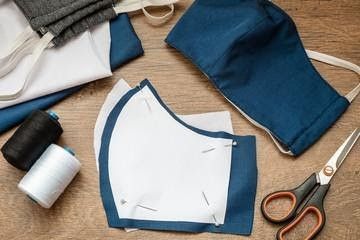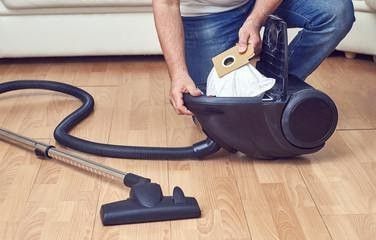Is it Safe to Use Vacuum Bags for Diy Masks
Table of contents

A homemade mask out of a vacuum bag
Controversy has exploded over whether it’s safe to construct a homemade mask out of a vacuum bag to fight the spread of the new coronavirus.
The Oregonian/OregonLive was among the media that reported earlier this week about a Cambridge University research that tested a range of commonly found home items as DIY mask material candidates -- including T-shirts, tea towels, scarves, and linen.
The researchers discovered vacuum bags as one of the top performers, filtering out 94 percent of airborne particles. Other studies looked at sweatshirts, pillowcases, and cotton bandanas, but the vacuum bags outshined almost all of them.
Our story included a link to a common YouTube video by Dr. Ryan Southworth, an emergency medicine doctor in Arizona, who recommends a HEPA filter vacuum bag.
Some readers responded with questions regarding the safety of vacuum bags, and referenced London doctor Simon Freilich, who said in a YouTube video that producing a mask from a HEPA vacuum bag is “a really, really awful thing to be doing.” He said the bags are made from “glass microfiber” that can harm the human respiratory system. Many Americans denote those microfibers as fiberglass.

Vacuum bag has no fiberglass and it can be
use for Diy Masks
After some pushback from YouTube viewers saying the bags they checked didn’t have harmful glass fibers in them, Freilich posted that he couldn’t explore “every possible type” and that there “are clearly numerous types of filters and materials out on the market.”
That has, in turn, spurred a spate of testimonials from individuals in the vacuum bag industry.
One came from Josh Wolcott of Vacuums R Us near Denver, Colo., also on video. He criticized the idea that vacuum bags contain fiberglass as a myth. Wolcott said his study included contacting various manufacturers and looking over safety data sheets that describe bag materials. He found no vacuum bags that have fiberglass, he said.
Another vacuum cleaner industry member, Vacuum Cleaner Market of Morgan Hill, Calif., also was adamant in its answer. “Vacuum bags have not ever, and do not contain fiberglass,” read a statement on the corporation’s website.
Health experts agree that fiberglass particles are harmful to inhale, and homemade masks shouldn’t be made from fiberglass materials.
To be sure, you might want to check with the manufacturer of any vacuum bag you’re thinking of using before producing a mask.
Or attempt using some other highly rated materials from the Cambridge University study. They comprise tea towels with two layers, filtered out 96 percent of particles, or a T-shirt, which filtered out 69 percent.




Log In
Create New Account